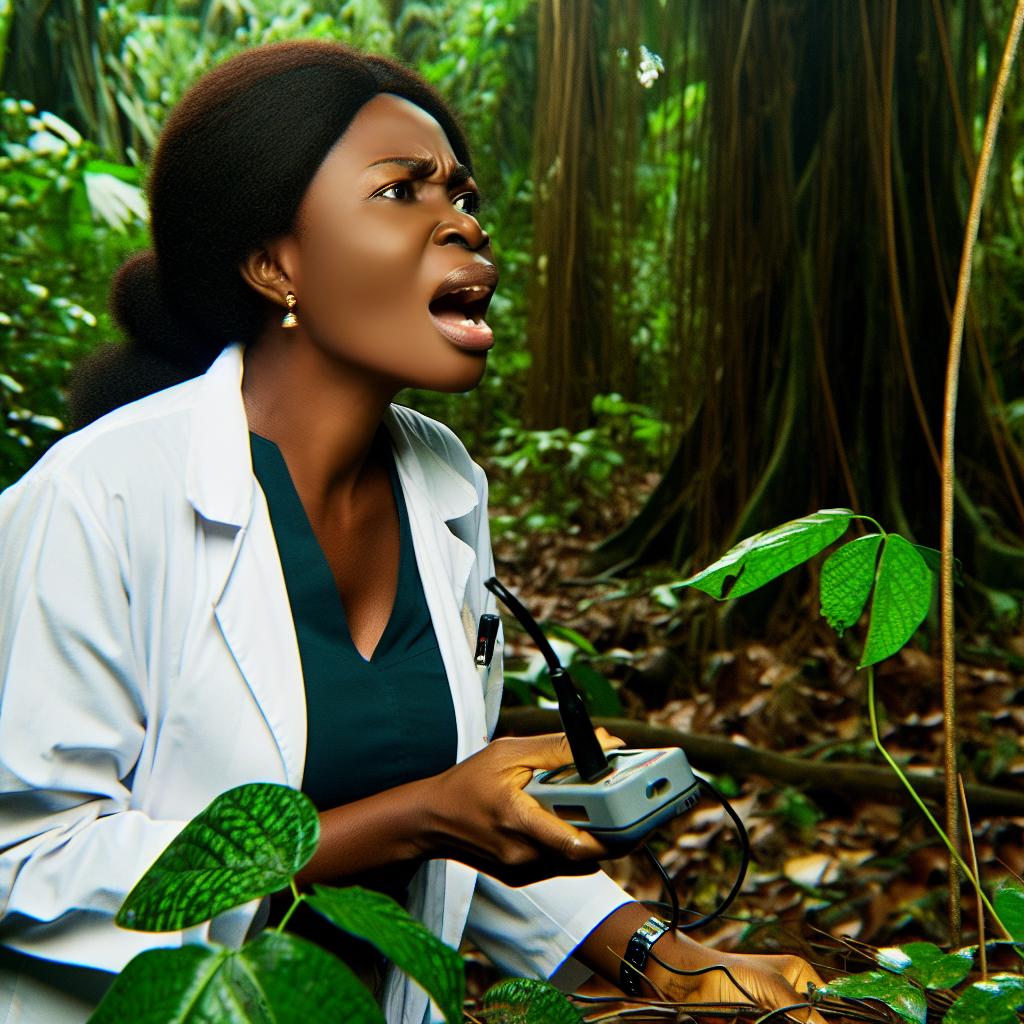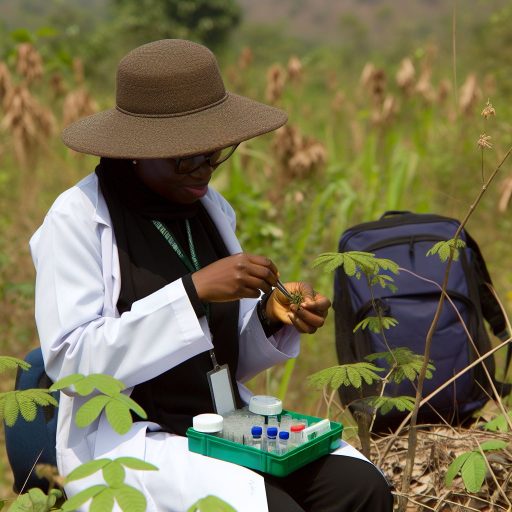Introduction:
A brief overview of the importance of conservation projects led by Nigerian scientists is crucial in addressing environmental challenges.
Nigeria, as a country, faces various conservation issues, such as deforestation, wildlife trafficking, and pollution.
Current State of Conservation Efforts in Nigeria:
Despite the challenges, Nigerian scientists have been at the forefront of innovative conservation projects.
They have implemented initiatives to protect endangered species, restore ecosystems, and raise awareness about environmental sustainability.
Overview of Nigerian scientists leading conservation projects:
When it comes to conservation efforts in Nigeria, there are several prominent scientists who have been at the forefront of various projects aimed at preserving the country’s natural resources.
These scientists have dedicated their time and expertise to addressing critical environmental issues and promoting sustainable practices.
Prominent Nigerian scientists involved in conservation efforts:
- Dr. Ejiro Egun is a leading environmental scientist known for her work in wildlife conservation.
- Prof. Adeyemi Ayodele leads projects focused on ecosystem preservation and restoration.
- Dr. Nneka Okonkwo specializes in marine conservation and sustainable fisheries management.
- Dr. Tunde Akinwande is renowned for his research on biodiversity conservation.
Areas of focus for these projects:
The conservation projects led by Nigerian scientists cover a wide range of areas, including:
- Wildlife conservation: Efforts to protect endangered species and their habitats.
- Ecosystem preservation: Initiatives aimed at maintaining the balance of ecosystems.
- Marine conservation: Projects focused on protecting marine biodiversity and ecosystems.
- Sustainable fisheries management: Strategies to ensure the long-term viability of aquatic resources.
- Biodiversity conservation: Research and conservation actions to safeguard the diversity of life forms.
These scientists are committed to making a positive impact on the environment and raising awareness about the importance of conservation.
Through their research and fieldwork, they strive to address pressing environmental challenges and contribute to the sustainable development of Nigeria’s natural resources.
Nigerian scientists leading conservation projects play a crucial role in preserving the country’s biodiversity, protecting its wildlife, and fostering a culture of environmental stewardship among the population.
Conservation Projects Led by Nigerian Scientists
Nigeria, a country rich in biodiversity, is home to many conservation projects led by Nigerian scientists.
These projects have made significant impacts on the environment and wildlife populations in the region.
Examples of Successful Conservation Projects in Nigeria
- Preservation of Cross River Gorillas in the Cross River National Park
- Protection of the Nigerian-Cameroon Chimpanzee in Gashaka-Gumti National Park
- Conservation of the Humpback Whale in the Gulf of Guinea
- Restoration of the Ogbunike Caves to protect the Bat population
- Riverine Turtle Conservation in the Niger Delta region
Impact of These Projects on the Environment and Wildlife Populations
The conservation projects led by Nigerian scientists have had a positive impact on the environment and wildlife populations in Nigeria.
Here are some of the key impacts:
- Preserved habitats for endangered species like the Cross River Gorillas and Nigerian-Cameroon Chimpanzees
- Increased awareness about the importance of biodiversity conservation among local communities
- Protection of critical ecosystems such as the Gulf of Guinea and the Niger Delta region
- Rehabilitation of degraded environments through sustainable conservation practices
- Promotion of ecotourism opportunities that benefit local economies and wildlife conservation efforts
Nigerian Scientists Making a Difference
Nigerian scientists play a crucial role in leading successful conservation projects.
They help protect the environment and wildlife populations in the country.
Their efforts not only preserve Nigeria’s rich biodiversity but also contribute to global conservation initiatives.
Explore Further: Overview of Environmental Biology in Nigeria
Challenges Faced by Nigerian Scientists in Conservation Efforts
Leading conservation projects as a Nigerian scientist comes with its fair share of obstacles and challenges.
These challenges can range from funding issues to lack of political support and insufficient public awareness.
Funding Challenges
- Nigerian scientists often struggle to secure adequate funding for their conservation projects.
- Lack of financial resources hampers research, fieldwork, and implementation of conservation strategies.
- Grant opportunities are limited, making it difficult for scientists to sustain their projects long-term.
- Funding from the government and non-profit organizations is essential for successful conservation efforts.
Political Support
- Nigerian scientists face challenges in gaining political support for their conservation initiatives.
- Government policies and regulations may not prioritize conservation efforts, hindering progress.
- Scientific recommendations for conservation may not align with political agendas, creating barriers.
- Political instability and corruption can also undermine conservation projects led by Nigerian scientists.
Public Awareness
- Public awareness about conservation issues in Nigeria is often inadequate.
- Nigerian scientists struggle to engage and educate the public about the importance of conservation.
- Lack of public support can impact funding, policy decisions, and the success of conservation projects.
- Implementing outreach programs and education initiatives is crucial to raising awareness among the Nigerian population.
Gain More Insights: Nigerian Fisheries and Marine Biology Research
Collaborations and Partnerships in Conservation Projects
Collaborations between Nigerian scientists and international organizations or institutions are crucial for the success of conservation projects in Nigeria.
These partnerships bring together diverse expertise, resources, and perspectives to address conservation challenges effectively.
Explore Collaborations between Nigerian Scientists and International Organizations or Institutions
- Nigerian scientists often collaborate with global conservation organizations such as WWF, WCS, and IUCN.
- Partnerships with academic institutions abroad enable knowledge exchange and capacity building for Nigerian researchers.
- Collaborations extend to government agencies, NGOs, and local communities to implement conservation initiatives.
- Joint research projects with international partners help Nigerian scientists access funding and cutting-edge technology.
Discuss the Benefits of Such Partnerships in Advancing Conservation Efforts in Nigeria
- Enhanced scientific collaboration leads to a better understanding of Nigeria’s biodiversity and ecosystems.
- Access to global networks allows Nigerian scientists to share best practices and lessons learned.
- Capacity building through training programs strengthens local expertise in conservation science and management.
- International partnerships raise awareness about conservation issues on a global scale, influencing policy decisions and actions.
- Collaborations foster a spirit of cooperation and mutual respect among stakeholders involved in conservation projects.
Collaborations and partnerships between Nigerian scientists and international organizations play a vital role in advancing conservation efforts in Nigeria.
These alliances bring together diverse perspectives, resources, and expertise to address the complex and interconnected challenges facing the country’s biodiversity and natural resources.
See Related Content: Environmental Management Tech Conferences in Nigeria
Innovative approaches in conservation projects:
Conservation projects led by Nigerian scientists have been at the forefront of adopting innovative techniques and methods to tackle environmental challenges.
Here are some examples of how technology and research advancements are being utilized in conservation projects:
Use of Drones:
Nigerian scientists have incorporated drone technology in their conservation efforts.
This allows them to conduct aerial surveys of wildlife populations and monitor their habitats effectively.
Drones provide a bird’s-eye view of the environment.
This enables researchers to gather data more efficiently and accurately.
DNA Analysis:
Advancements in DNA analysis have revolutionized conservation biology.
Nigerian scientists are using DNA techniques to identify and track endangered species.
They study genetic diversity and combat wildlife crimes such as poaching and illegal trade.
This method helps in developing targeted conservation strategies.
Additionally, it enhances understanding of species’ populations better.
Satellite Tracking:
By utilizing satellite tracking technology, Nigerian scientists can monitor the movements of animals across vast landscapes.
This method provides valuable insights into migration patterns, habitat use, and behavior of various species.
Satellite tracking helps in identifying critical habitats.
Transform Your Career with Expert Guidance
Get personalized mentorship consulting that’s tailored to your unique path. Our expert advice is actionable and exclusive.
Get StartedIt informs conservation decisions to protect these areas effectively.
Citizen Science Platforms:
Nigerian scientists have embraced citizen science platforms.
These platforms engage local communities in conservation efforts.
Individuals can contribute data, observations, and insights.
This enhances the scope and reach of conservation projects.
By involving the public in scientific research, scientists gather large amounts of data.
This process raises awareness and fosters a sense of environmental stewardship among the community.
Artificial Intelligence:
Artificial intelligence (AI) is increasingly used in conservation projects.
It analyzes vast amounts of data and detects patterns that human researchers may overlook.
Nigerian scientists are harnessing AI algorithms to process camera trap images.
They predict wildlife populations and optimize conservation strategies.
This innovative approach helps in efficient and data-driven decision-making.
It supports better conservation outcomes.
Nigerian scientists continually push the boundaries of conservation biology.
They adopt innovative approaches and leverage technology to address pressing environmental issues.
These groundbreaking methods enhance the efficacy of conservation projects.
They also pave the way for sustainable and effective conservation efforts in the future.
See Related Content: Ecotourism Opportunities in Nigeria

Community Involvement in Conservation Projects
Community involvement is crucial in the success of conservation projects led by Nigerian scientists.
By engaging local communities in conservation efforts, scientists can create a sense of ownership and responsibility among community members towards protecting their natural resources.
Importance of Involving Local Communities in Conservation Efforts:
- Increased Awareness and Education: By involving local communities, scientists can educate them about the importance of conservation and how their actions can make a difference in preserving the environment.
- Traditional Knowledge: Local communities often possess valuable traditional knowledge about the ecosystems in their area. By engaging them, scientists can learn from their knowledge and incorporate it into conservation strategies.
- Sustainable Practices: Involving local communities ensures that conservation efforts are sustainable in the long run. By working together, scientists and community members can develop practices that benefit both the environment and the people living in the area.
- Empowerment and Capacity Building: Community involvement in conservation projects empowers local residents to take an active role in protecting their environment. This leads to capacity building and skills development among community members.
Examples of Successful Community Engagement Strategies Used by Nigerian Scientists:
- Community Meetings and Workshops: Nigerian scientists organize community meetings and workshops to discuss conservation goals, share information, and gather feedback from community members.
- Collaborative Projects: Scientists collaborate with local communities on conservation projects, such as tree planting initiatives, habitat restoration, and wildlife monitoring programs.
- Training and Education: Nigerian scientists provide training and education to community members on environmental conservation, sustainable practices, and the importance of preserving natural resources.
- Partnerships with Local Leaders: Scientists partner with local community leaders to gain support for conservation efforts and to ensure that projects align with the needs and priorities of the community.
Future outlook for conservation projects led by Nigerian scientists:
Predict the future direction of conservation efforts in Nigeria
The future of conservation projects led by Nigerian scientists looks promising.
More awareness is being raised about the importance of preserving the country’s natural resources.
With the increasing threat of climate change, there is a growing sense of urgency.
Protecting biodiversity and ecosystems in Nigeria is essential.
Nigerian scientists are at the forefront of innovative research.
They are leading initiatives aimed at conservation and sustainable development.
Discuss opportunities for growth and expansion in the field of conservation led by Nigerian scientists
Several opportunities exist for growth and expansion in conservation.
One key opportunity is collaborating with international organizations.
This can help leverage resources and expertise for conservation efforts.
Implementing best practices can also scale up conservation initiatives.
Advancements in technology and data-driven approaches are crucial.
Nigerian scientists can use remote sensing and GIS mapping effectively.
These tools help monitor and evaluate the impact of conservation projects.
Engaging local communities and stakeholders is also important.
Empowering communities to take ownership ensures sustainable outcomes.
Nigerian scientists can also build partnerships with government agencies.
This can open new avenues for funding and collaboration.
By tapping into these opportunities, significant strides can be made.
Protecting Nigeria’s natural heritage for future generations is essential.
Significance of Conservation Projects in Nigeria
Conservation projects led by Nigerian scientists are crucial for preserving the country’s biodiversity.
These initiatives help tackle environmental challenges and protect endangered species.
Continued support is essential to ensure the long-term success of these conservation efforts.
By supporting Nigerian scientists in their conservation projects, we can help create a more sustainable environment for future generations.
Additional Resources
Environmental education outcomes for conservation: A systematic …




